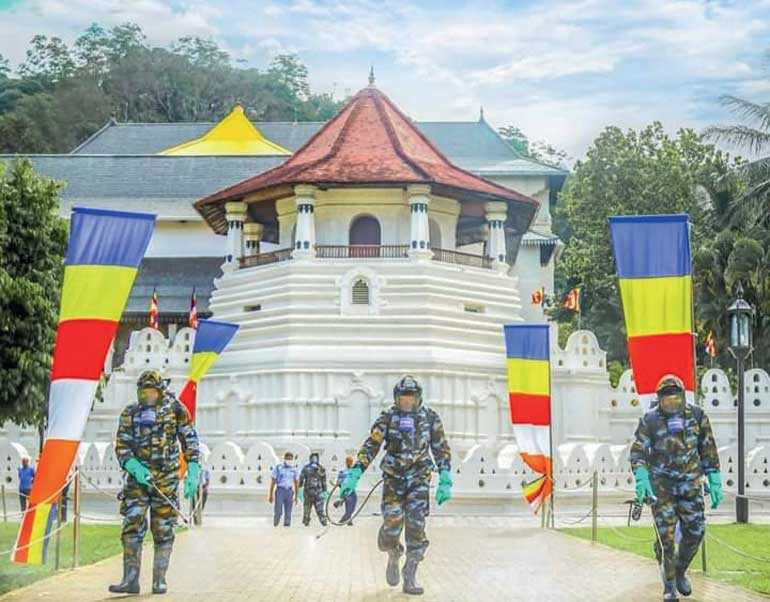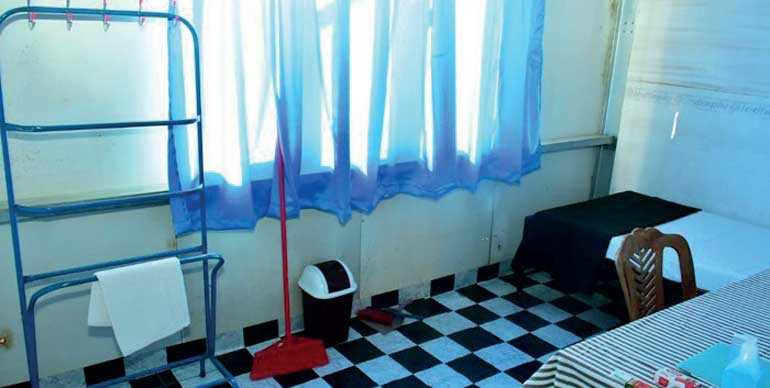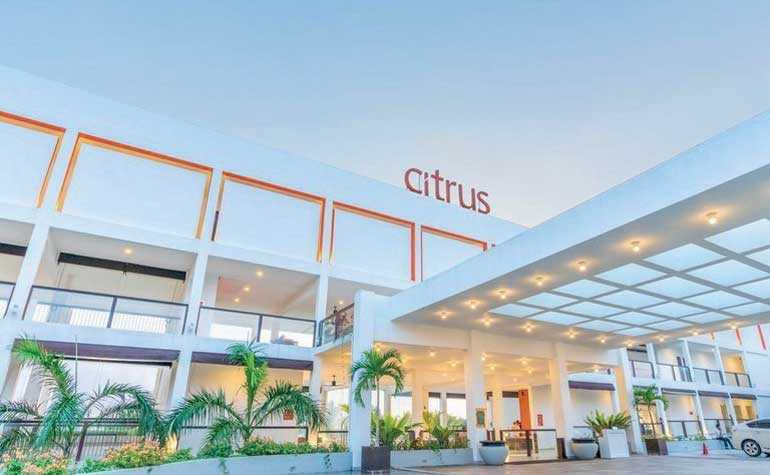Tuesday Feb 24, 2026
Tuesday Feb 24, 2026
Monday, 30 March 2020 00:00 - - {{hitsCtrl.values.hits}}

Sri Lanka Air Force, conducting fumigation at the famous ” Temple of the Tooth Relic.”
healthreviewglobal.com: Sri Lanka, dubbed as the ‘Pearl of the Indian Ocean’, is a very famous tropical destination among thousands. The island nation ranked as the number one tourist destination by Lonely Planet.
We did a thorough analysis of public health measures employed by Sri Lanka.
The point to ponder is how a properly organised preventive care plan can bring about astounding results in a pandemic situation.
Sri Lanka health system – brief
The Sri Lankan health system has both public and private healthcare sectors. The public health system is free for all citizens. Going hand-in-hand, Sri Lanka has a free education system until graduate school for the last 60 years.
Thanks to the free education system, Sri Lanka has trained thousands of well-qualified healthcare professionals and paramedical workforce for many decades through nine well-regulated and state-of-the-art medical faculties covering all regions of the country. And, all free-of-charge. The doctors and paramedical staff receive post-graduate training and continuous medical education throughout their career.
Sri Lanka boasts of a well-planned radial public health institution system. The private health system is tightly regulated under the private healthcare regulatory commission and the Government.
The island nation has a robust century-old community health program. Health statistics such as maternal and child mortality rates are the lowest in the region. In fact, comparable to the western world, the life expectancy is highest in the region. The paradise nation is 100% vaccination covered, and all treatments under the extended program of immunisation are administered free-of-charge.
The Ministry of Health regulates and sets the guidance to the future policies of the health system.
Coronavirus threat
Since the origin of the novel coronavirus in Wuhan, the Sri Lankan authorities started to take vigilance in stopping the potential danger. The military forces and the national intelligence service were put on high alert. The Government created specialised aviation and border control expert teams to track the movement of all inbound tourists and with a potential threat.
The first case
27 January – A 43-year-old lady from Hubei Province, China was the first confirmed case of COVID-19 in Sri Lanka. The authorities immediately admitted the patient to the National Infectious Disease Hospital. She was isolated and treated by infectious disease specialists. The patient recovered uneventfully and discharged back to China with a public farewell event.
One of the first countries to rescue and quarantine
1 February – Sri Lanka became one of the first countries to send rescue missions to Wuhan, China to evacuate 33 Sri Lankan families. The families were brought down via an exclusive carrier and quarantined in a unique quarantine facility. All potential contacts are observed continuously under quarantine.
The first local case
10 March – A 52-year-old Sri Lankan becomes positive for COVID-19. The patient has served as a travel guide to a group of Italians. The patient all contacts are quarantined and supervised.
The sequel
12 March – The second local infected with the virus is detected. The 44-year-old man admitted to the Infectious Disease Hospital, and they traced his contacts. The Sri Lankan Government has requested the general public to practice proper hygiene methods and self-quarantine methods to safeguard from the disease.
14 March – The Sri Lankan Government declared 16 March as a national public holiday to contain the coronavirus spreading in the country.
15 March – Sri Lankan President Gotabaya Rajapaksa proposed plans to combat coronavirus to the South Asian Association for Regional Cooperation (SAARC) leaders during a video press conference. Sri Lankan President directed the authorities to implement quarantine centres to examine the foreigners and ordered relevant authorities to provide necessary essential services to the general public via the internet.
16 March – The Sri Lanka Government Medical Officers Association (GMOA) requested the President to extend the public holiday to one week, and close all ports of entry to the country. The Government of Sri Lanka extended the public holidays to three days from 17 March to 19 March due to an increase in new cases except for health, banking, food supply and transportation.
17 March – The President ordered the banking sector not to overburden the coronavirus hit business sector, which is unable to repay the loans and ordered the banking sector further to extend the payback period to another six months. The Ministry of Health revealed that around 24 hospitals are available ready to tackle the coronavirus emergency.
19 March – The Government decided to further extend the public holidays for eight days to both private and public sectors. Therefore, work from home for eight days was declared. The State-imposed island-wise curfew to cease all public gatherings and movement. All potential contacts and people with travel history were registered by the local Police authorities.
21 March – The Government also urged the public not to utilise chloroquine at will. Many leading four-star hotels offered their facilities to the Government as quarantine facilities.
23 March – Sri Lankan authorities have reported 86 positive coronavirus cases and zero deaths. We have studied the responses of many countries to the coronavirus pandemic. We at healthreviewglobal.com decided to select Sri Lanka for its swift and impressive response to the global epidemic despite being a second world economy. On top of it, we learned the importance of investing in public health.
26 March – Sri Lankan authorities have published details of two more positive cases after a day of silence. The Government has extended the local curfew for three urban districts suspecting more sporadic cases. According to local media, the Police and State and private sector have arranged door-to-door food and necessity delivery services. Work at home policy got extended as well.
The island nation has closed its airports for arrivals since last week. (healthreviewglobal.com/sri-lanka-coronavirus-update-setting-a-global-example/?fbclid=IwAR3tbWzLoUYVK11iE5zFwCMyMIAx8lMf4anfwItR1Mq1JQKoNnqY2o5SNmU)

A warm farewell to the Chinese lady who recovered in Sri Lanka by Minister of Health

A Sri Lanka army quarantine facility

Hotels offered as quarantine centres to the governmen